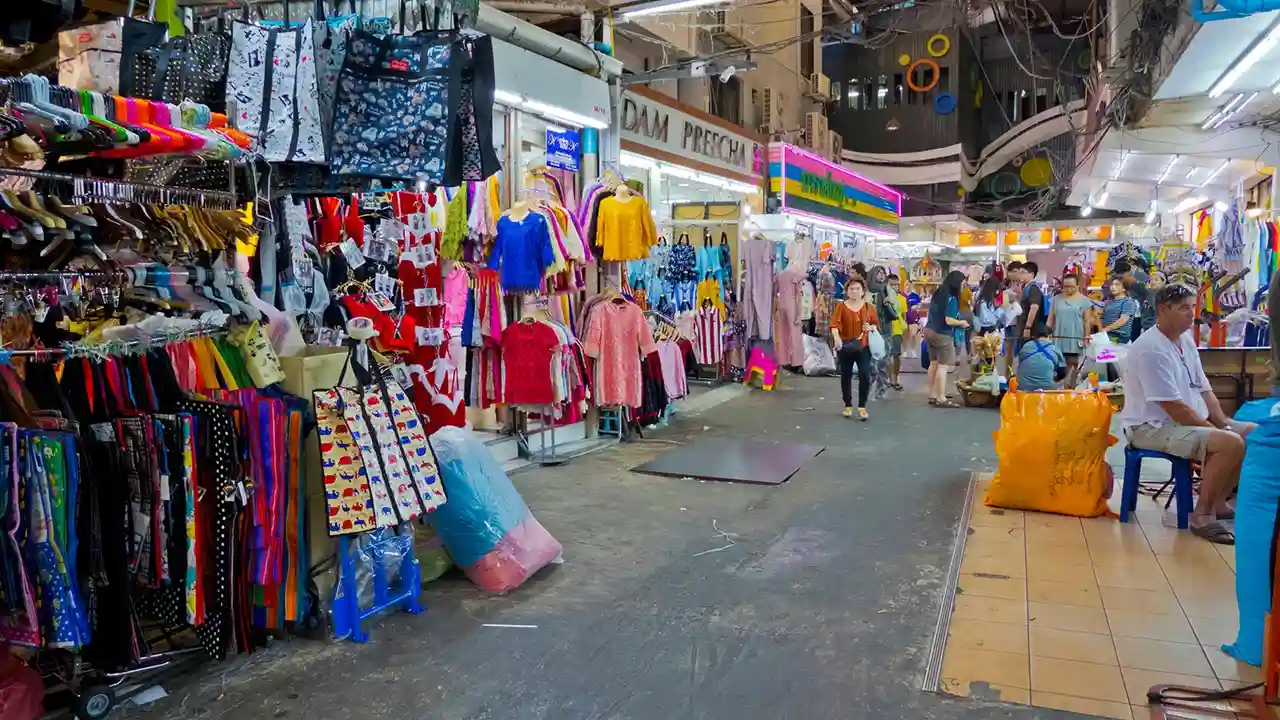Bargaining in Thailand: How to get the best deals

Understanding the Art of Thai Bargaining Culture Key Phrases and Etiquette
Alright, so you're heading to Thailand, land of smiles and…bargains! But before you dive headfirst into the bustling markets, let's get one thing straight: bargaining in Thailand isn't about ripping anyone off. It's a social dance, a friendly game, and a way to get a fair price while respecting the vendor. Think of it as building a connection, not a confrontation.
First things first, learn a few key Thai phrases. "Tao rai?" (How much?) is your bread and butter. "Lot noi dai mai?" (Can you lower the price a little?) is your magic wand. And a simple "khop khun" (thank you) goes a long way, regardless of whether you buy anything. Remember, a smile and a polite attitude are your best bargaining tools. Don't be aggressive or demanding. It's all about being friendly and respectful.
Keep in mind that bargaining is generally expected in markets, street stalls, and smaller shops. Don't try to haggle in department stores or restaurants. And always bargain with a smile! A good starting point is to offer about 30-50% below the asking price, but gauge the situation first. If the vendor seems offended, you might have started too low. Listen to your gut.
Essential Bargaining Techniques for Thai Markets Haggling Like a Pro
Okay, let's talk tactics. First, do your research. Before you even approach a stall, know the general price range for the item you want. This gives you a solid foundation for your negotiations. Observe other customers and see what they're paying. Knowledge is power!
Second, start low, but not insulting. As mentioned before, 30-50% below the asking price is a good starting point. Be prepared to walk away. Sometimes, the vendor will call you back with a better offer. If not, no worries! There are plenty of other stalls selling similar items.
Third, bundle items together. If you're buying multiple things from the same vendor, you have more leverage. Offer a single price for the whole lot. This often works because vendors are more willing to give a discount for a larger sale.
Fourth, use the "flaw" technique (sparingly!). If you spot a minor imperfection, politely point it out. "Oh, I noticed this small scratch. Can you lower the price a little?" But be careful not to be overly critical. The goal is to gently nudge the price down, not to offend the vendor.
Fifth, be prepared to walk away. This is the ultimate bargaining power move. If you can't agree on a price, thank the vendor and start to walk away. Often, they'll call you back with a counteroffer. If not, there are plenty of other stalls! This shows you're serious about your budget and not afraid to look elsewhere.
Recommended Products for Your Thailand Trip and Where to Bargain For Them Souvenirs Clothing and More
Let's get specific. What should you be looking to buy and bargain for in Thailand?
- Thai Silk Scarves: These are a classic souvenir. Look for them in markets like Chatuchak Weekend Market in Bangkok or night markets in Chiang Mai. A good quality silk scarf might initially be priced at 800-1200 baht. Aim to pay around 500-700 baht after bargaining.
- Elephant Pants: Comfortable and iconic! You'll find these everywhere. The initial price is usually around 200-300 baht. You should be able to get them for 150-200 baht.
- Handicrafts: Wood carvings, ceramics, and other handicrafts are great souvenirs. Again, Chatuchak Market is a good place to start. The price depends on the item, but always try to bargain down at least 20-30%.
- Spices and Teas: Bring the flavors of Thailand home with you. Look for spices and teas in markets and specialty shops. Don't be afraid to ask for samples! Bargaining is less common for these items, but you can still try to negotiate a discount if you're buying in bulk.
Product Comparison: Backpacks for Thailand Travel Choosing the Right One for Your Needs and Budget
Choosing the right backpack can make or break your trip. Here's a comparison of a few popular options:
- Osprey Atmos AG 65: This is a high-end backpack known for its excellent suspension and comfort. It's ideal for long-term travel and carrying heavy loads. Pros: Comfortable, durable, well-ventilated. Cons: Expensive (around $300), heavy. Best for: Serious backpackers and those carrying a lot of gear.
- REI Co-op Flash 50: A lightweight and versatile backpack that's great for weekend trips and shorter adventures. Pros: Lightweight, affordable (around $150), comfortable. Cons: Less durable than the Osprey, less supportive for heavy loads. Best for: Budget-conscious travelers and those packing light.
- Tortuga Setout Laptop Backpack 45L: Designed for digital nomads and those traveling with laptops and other electronics. Pros: Laptop compartment, comfortable straps, durable. Cons: Expensive (around $200), not ideal for hiking. Best for: Digital nomads and business travelers.
Usage Scenarios:
- Osprey Atmos AG 65: Trekking in the mountains of Northern Thailand, island hopping in the south, long-term travel across Southeast Asia.
- REI Co-op Flash 50: Weekend trips to national parks, exploring cities, short backpacking trips.
- Tortuga Setout Laptop Backpack 45L: Working remotely from cafes in Chiang Mai, attending conferences in Bangkok, traveling for business.
Bargaining for Services in Thailand Massages Tailoring and Transportation
Bargaining isn't just for goods; you can also negotiate the price of services. Here's how:
- Massages: Spa prices are usually fixed, but you can often bargain for a discount at smaller massage parlors, especially during off-peak hours. Try asking for a "happy hour" discount.
- Tailoring: Bargaining is essential when getting clothes tailored. Get quotes from multiple tailors before settling on a price. Negotiate based on the complexity of the garment and the quality of the fabric.
- Tuk-Tuks and Taxis: Always agree on a price before getting in a tuk-tuk or taxi. Use a ride-hailing app like Grab to get an idea of the fair price. Be prepared to negotiate, especially in touristy areas.
Avoiding Scams and Maintaining Respectful Bargaining Practices Protecting Yourself and Supporting Local Businesses
While bargaining is part of Thai culture, it's important to be aware of potential scams and to bargain respectfully. Here are a few tips:
- Be wary of overly aggressive vendors. If someone is pushing you too hard to buy something, it's best to walk away.
- Beware of "gem scams." These scams involve vendors trying to sell you overpriced or fake gems.
- Don't be afraid to say no. If you're not comfortable with the price, simply walk away.
- Remember that bargaining is a social interaction. Be polite, respectful, and have fun!
- Support local businesses. By bargaining fairly, you're helping local vendors earn a living.
Specific Product Recommendations and Pricing Examples for Thailand Souvenirs
Let's delve deeper into specific souvenir recommendations and realistic bargaining targets:
- Silver Jewelry: You can find beautiful silver jewelry in Thailand, especially in Chiang Mai. Look for pieces with intricate designs. A silver ring initially priced at 1500 baht should be negotiable down to 800-1000 baht. Verify the silver content ("925" marking).
- Coconut Oil Products: Coconut oil is a popular beauty product. Look for pure, cold-pressed coconut oil. A bottle initially priced at 400 baht should be negotiable down to 250-300 baht.
- Thai Paintings: Small, colorful paintings are great souvenirs. Look for scenes of temples, elephants, or landscapes. A painting initially priced at 600 baht should be negotiable down to 350-450 baht.
- Incense and Essential Oils: Bring the scents of Thailand home with you. Look for natural incense and essential oils made from local ingredients. A set of incense and essential oils initially priced at 500 baht should be negotiable down to 300-400 baht.
Bargaining Language Survival Kit Essential Phrases for Successful Negotiation
Here’s a quick reference guide to essential Thai phrases for bargaining:
- Tao rai? (How much?)
- Lot noi dai mai? (Can you lower the price a little?)
- Paeng pai! (Too expensive!)
- Lot ik noi dai mai? (Can you lower it a little more?)
- An nee arai? (What is this?)
- Khop khun. (Thank you.)
- Mai ao. (I don't want it.)
Real-World Bargaining Scenarios in Thailand Stories from the Markets
Let’s look at some real-life examples:
Scenario 1: The Silk Scarf at Chatuchak Market
I was browsing silk scarves at Chatuchak Market in Bangkok. The vendor initially quoted 1000 baht for a beautiful scarf with intricate patterns. I started by offering 500 baht. He countered with 800 baht. I politely said it was still too expensive and started to walk away. He called me back and offered it for 650 baht. I accepted, and we both walked away happy.
Scenario 2: The Elephant Pants in Chiang Mai
I wanted to buy a pair of elephant pants in Chiang Mai. The initial price was 250 baht. I offered 150 baht. The vendor laughed and said 200 baht. I countered with 180 baht, and he agreed. It was a quick and easy negotiation.
Scenario 3: The Tailored Shirt in Bangkok
I wanted to get a shirt tailored in Bangkok. I visited several tailors and got quotes ranging from 1500 baht to 2500 baht. I chose a tailor who quoted 1800 baht and negotiated the price down to 1500 baht by mentioning that other tailors had offered lower prices.
The Psychology of Bargaining Understanding the Vendor's Perspective
To be a successful bargainer, it's helpful to understand the vendor's perspective. They are trying to make a living, and they have expenses to cover. They also know that tourists are often willing to pay more than locals. By understanding their motivations, you can approach bargaining with more empathy and respect.
Sustainable Bargaining Supporting Local Artisans and Ethical Practices
Consider the impact of your bargaining on local artisans and businesses. Overly aggressive bargaining can drive prices down to unsustainable levels, harming the livelihoods of local communities. Aim for a fair price that benefits both you and the vendor. Look for opportunities to support ethical and sustainable businesses.
Final Thoughts on Bargaining in Thailand Enjoy the Experience
Bargaining in Thailand is an integral part of the cultural experience. Embrace the opportunity to interact with local vendors, learn about their products, and practice your negotiation skills. Remember to be respectful, have fun, and enjoy the process!
:max_bytes(150000):strip_icc()/277019-baked-pork-chops-with-cream-of-mushroom-soup-DDMFS-beauty-4x3-BG-7505-5762b731cf30447d9cbbbbbf387beafa.jpg)






